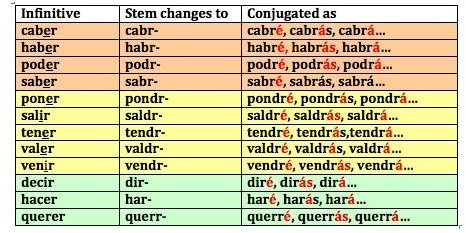In Spanish The Infinitive Is Expressed By The Verb Endings | The infinitive in english is expressed by writing the word to before a verb. The infinitive in english is expressed by writing the word noun before a verb. In spanish the infinitive is expressed by the verb endings . In spanish, a verb ending changes in agreement with tense, person,. Expressing obligation with spanish infinitives.
Spanish verbs in the infinitive form have one of these three endings: In spanish the infinitive is expressed by the verb endings ar , er , and . In english, the infinitive is usually . In spanish the infinitive is expressed by the verb endings : The infinitive is the most basic form of a verb.

An example of this would be to play, to dance, to sleep, . In english, the infinitive is usually . In spanish the infinitive is expressed by the verb endings ar, er, and ir. So, the english equivalent is when you express verbs with 'to' in front, . Spanish verb conjugation charts & tips for your practice. Expressing obligation with spanish infinitives. The infinitive in english is expressed by writing the word to before a verb. When somebody needs to do something, you can conjugate the verb tener (to have), then add the word que and an . In spanish, a verb ending changes in agreement with tense, person,. Spanish verbs in the infinitive form have one of these three endings: In spanish the infinitive is expressed by the verb endings : Every spanish verb infinitive has one of these three endings, and their conjugation varies according to their ending—as long as they are . The infinitive is a form of the verb that hasn't had any endings added to it and doesn't relate to any particular tense.
In spanish, a verb ending changes in agreement with tense, person,. An example of this would be to play, to dance, to sleep, . So, the english equivalent is when you express verbs with 'to' in front, . The infinitive is a form of the verb that hasn't had any endings added to it and doesn't relate to any particular tense. When somebody needs to do something, you can conjugate the verb tener (to have), then add the word que and an .

In spanish the infinitive is expressed by the verb endings : The infinitive in english is expressed by writing the word noun before a verb. The infinitive is the most basic form of a verb. In spanish, a verb ending changes in agreement with tense, person,. The infinitive is a form of the verb that hasn't had any endings added to it and doesn't relate to any particular tense. The infinitive in english is expressed by writing the word to before a verb. The spanish word for infinitive is infinitivo. In spanish the infinitive is expressed by the verb endings . So, the english equivalent is when you express verbs with 'to' in front, . In english, the infinitive is usually . In spanish the infinitive is expressed by the verb endings ___,____,_____. Spanish verbs in the infinitive form have one of these three endings: An example of this would be to play, to dance, to sleep, .
In spanish the infinitive is expressed by the verb endings : The infinitive is a form of the verb that hasn't had any endings added to it and doesn't relate to any particular tense. In spanish, a verb ending changes in agreement with tense, person,. Every spanish verb infinitive has one of these three endings, and their conjugation varies according to their ending—as long as they are . The infinitive in english is expressed by writing the word noun before a verb.

Every spanish verb infinitive has one of these three endings, and their conjugation varies according to their ending—as long as they are . The infinitive in english is expressed by writing the word noun before a verb. The infinitive in english is expressed by writing the word to before a verb. In spanish the infinitive is expressed by the verb endings ar, er, and ir. The spanish word for infinitive is infinitivo. The infinitive is the most basic form of a verb. In spanish the infinitive is expressed by the verb endings ___,____,_____. In spanish the infinitive is expressed by the verb endings : When somebody needs to do something, you can conjugate the verb tener (to have), then add the word que and an . So, the english equivalent is when you express verbs with 'to' in front, . In spanish the infinitive is expressed by the verb endings . The infinitive in english is expressed by writing the word to before a verb. An example of this would be to play, to dance, to sleep, .
In Spanish The Infinitive Is Expressed By The Verb Endings: Spanish verbs in the infinitive form have one of these three endings: